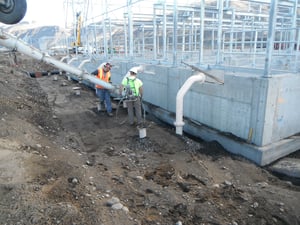 Last year I suggested Four Tips for User Friendly and Maintainable Fish Facilities, based on my experience as a construction manager. This is a topic worth revisiting, and it applies to many types of projects beyond fish facilities as well. I hope you find these ideas useful!
Last year I suggested Four Tips for User Friendly and Maintainable Fish Facilities, based on my experience as a construction manager. This is a topic worth revisiting, and it applies to many types of projects beyond fish facilities as well. I hope you find these ideas useful!
Have you spent significant dollars constructing your fish facilities only to spend additional money later to modify or have the operation and maintenance (O&M) staff “jerry rig” something so it will operate as needed?
You’re not alone. Fish facilities are often complex projects with a multitude of electrical, mechanical and other moving parts. Modifications during or after construction can be considerably expensive, especially on these facilities which are often in remote locations, so you want to get it right the first time.
You spend significant time and money planning, permitting, designing and constructing fish facilities. Often times O&M staff will make modifications using simple materials such as plywood and pulleys. While these modifications are generally low cost and functional, the materials may not stand up over time. The following tips will help you get it right the first time and avoid costly repairs and frustrated O&M staff.
1. Involve Operations and Maintenance Staff Early and Often
Your O&M staff are the end users of the facility and have a huge impact on its success. Involving them during the conceptual and permitting stage will help to ensure the facility meets performance criteria, has efficient work flow, can easily be maintained, and is ergonomic. This will help to ease the burden on your staff, especially for repetitive processes. Efficient workflow saves time and money, allowing your staff to get more done at less cost.
Your O&M staff are strategically positioned to identify parts of your facility that may be difficult to maintain or operate. Examples include screens that are awkward or difficult to clean and tasks that require heavy lifting in awkward positions that can cause back strain.
I’ve seen firsthand how keeping O&M staff involved throughout all project phases from the conceptual design to final design and construction leads to success. Dedicating your staff’s time during all phases can pay significant long term dividends in lower operations and maintenance costs.
2. Perform Constructability Reviews Prior to Final Design
Design documents that are difficult or impossible to construct cause you to pay dearly in the form of construction change orders and post construction modifications. Leveraging the experience and knowledge of a contractor or construction manager to perform a constructability review before finalizing the design will help to identify and resolve potential problem areas before bidding.
3. 3-D Modeling
Three dimensional facilities can be hard to understand on two dimensional paper. Spending the money to prepare a 3-D computer model of your facility is typically only a fraction of your overall project cost. This investment can pay significant dividends by:
-
Increasing non-technical stakeholders’ ability to understand what you are about to build, which allows them to identify potential problem areas and provide more valuable input during design.
-
Identifying piping, mechanical and other conflicts early to reduce construction change orders.
-
Helps encourage designers to provide a layout that optimizes efficiency and workflow.
In some industries an inexpensive cardboard “mock-up” is constructed to provide the Owner with a better understanding of the proposed layout. Could a similar mock-up be feasible for your next small scale fish sorting facility?
4. Employ an Experienced Construction Team
You’ve finally reached the construction phase. Now is the time to ensure you have an experienced team to bring your project to completion. Correctly selecting a contractor and contracting method is paramount. An experienced construction team with a good understanding of the intended use and function of the facility can help to identify problems and provide recommended revisions before items are fully constructed and become costly to modify. And if you don’t have experienced staff in-house to oversee the contractor’s work, a construction management and inspection consultant with fish facility experience can pay huge dividends and keep you out of the contractor’s line of fire.
Have you experienced “jerry rigging” after a project is completed? Or do you have any other tips to add? I’d love to hear from you. You can reach me by leaving a comment below, or by emailing me at jirving@mackaysposito.com. Here’s to the success of your next fish facility project.

